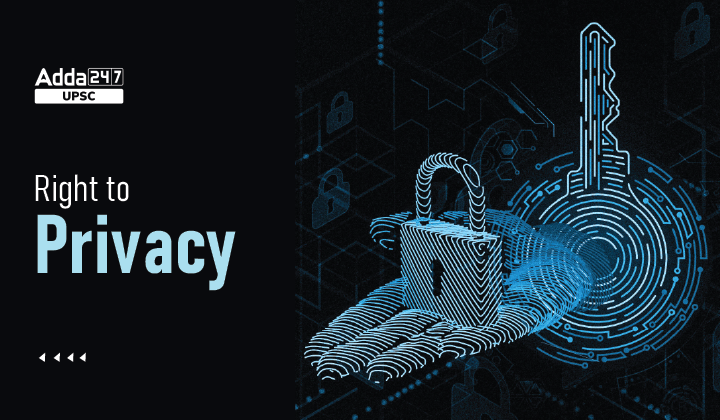Table of Contents
Right to Privacy- Relevance for UPSC Exam
General Studies II- Challenges to internal security through communication networks, role of media and social networking sites in internal security challenges, basics of cyber security; money-laundering and its prevention.
In News
- Judgment in the Puttaswamy case five years ago by Supreme court asserted that Indians have a constitutionally protected fundamental right to privacy.
Right to Privacy can be defined as
- A right to be let alone.
- The right of a person to be free from any unwarranted publicity.
- The right to live without any unwarranted interference by the public in matters with which the public is not necessarily concerned.
What is Data?
- Data is a collection of discrete values that convey information, describing quantity, quality, fact, statistics, other basic units of meaning, or simply sequences of symbols that may be further interpreted.
Difference between Data Protection and Data Privacy
- Data protection refers to policies and procedures seeking to minimize intrusion into the privacy of an individual caused by collection and usage of their personal data while data privacy refers to controlling access to the data.
- Organizations must determine who has access to data as a privacy breach can lead to data security concerns.
- Data security refers specifically to measures taken to protect the integrity of the data itself against manipulation and malware and provides protection from internal and external threats.
Why we need data protection?
- Increasing internet use: India currently has over 750 million Internet users, with the number only expected to increase in the future.
- Data breaches: At the same time, India has among the highest data breaches in the world. Without a data protection law in place, the data of millions of Indians continues to be at risk of being exploited, sold, and misused without their consent.
- Individual privacy: Data monetization may happen at cost of individual privacy. The most sought-after datasets are those that contain sensitive personal data of individuals, ex. medical history, financial data.
Data protection in India
- Data privacy breaches which result in the loss and theft of personal, sensitive data have not reduced in terms of measurable frequency or their impact.
- The right to privacy was recognized as a fundamental right, included under the right to life and liberty by the Supreme Court of India in 2017.
- Without a law in place to regulate data collection and to act as an oversight mechanism, valid concerns about privacy and other rights violations continue to arise.
- Technologies like Artificial Intelligence and Big Data are costly to implement.
- It is important to put appropriate safeguards in place in order to ensure the integrity of the repository/database, so that it does not leak out the information and is not privatized or monetized.
- As the data collected may be used in the court of law during the course of a criminal trial, the reliability and the admissibility of the data along with standards and procedures followed would be taken into consideration. Hence, the authenticity of the data is crucial.
Need of the hour
- There urgent need for robust data protection law as digitization relies on gathering personal data which involves the risk of theft of sensitive data that can be dangerous for an individual as well as for a country.




 TSPSC Group 1 Question Paper 2024, Downl...
TSPSC Group 1 Question Paper 2024, Downl...
 TSPSC Group 1 Answer key 2024 Out, Downl...
TSPSC Group 1 Answer key 2024 Out, Downl...
 UPSC Prelims 2024 Question Paper, Downlo...
UPSC Prelims 2024 Question Paper, Downlo...





